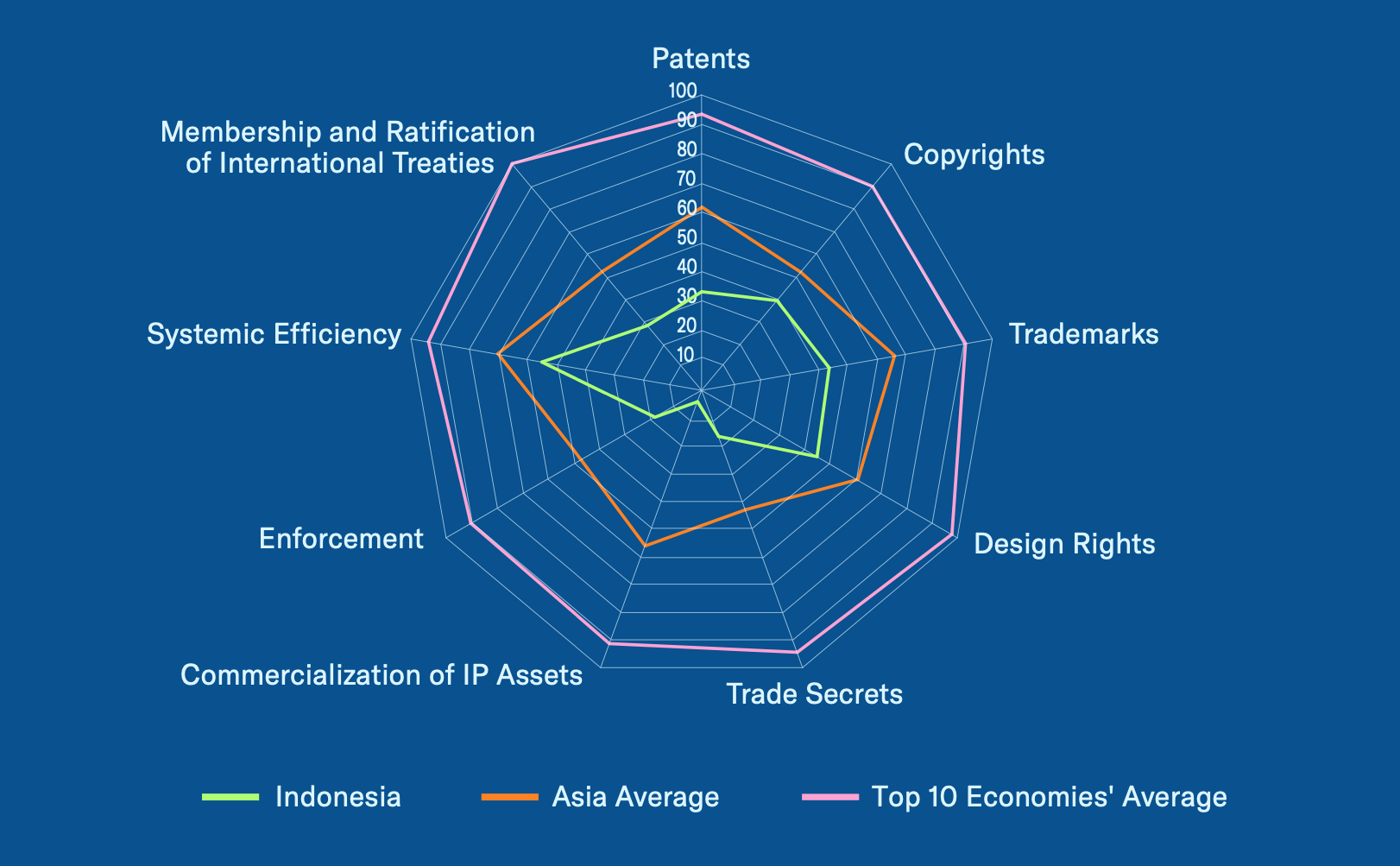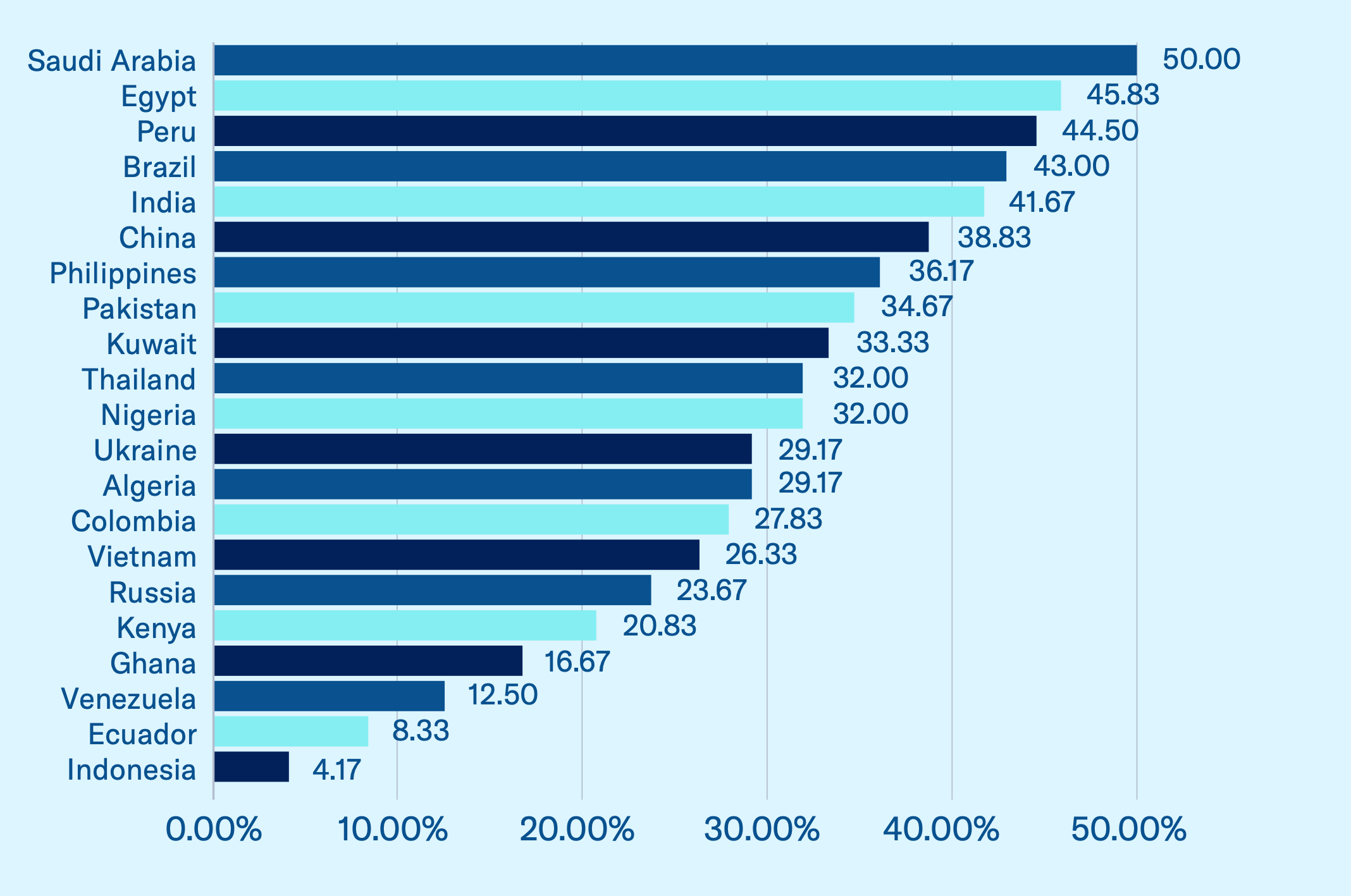Every year, the United States Chamber of Commerce releases the “International Intellectual Property Index,” which ranks countries worldwide based on their growth in Intellectual Property, commercialization of Intellectual Property assets, law enforcement, system efficiency, and membership and ratification of international treaties. This year, Indonesia is ranked 49th out of 55 countries, or 7th from the bottom. What caused it?
The International Intellectual Property (IP) Index is a comprehensive assessment of the intellectual property framework of countries worldwide. It indirectly shows a country’s policies in encouraging innovation, creativity, economic growth, and wider investment opportunities.
Intellectual Property Becomes an Important Decision for Investment
Intellectual Property as an asset must be recognized. Today’s large companies are at the forefront thanks to their Intellectual Property assets. Technology companies such as Tesla, Apple, Microsoft, and even Walt Disney became rich thanks to the Copyrights, Patents, Trademarks, Industrial Designs, and Trade Secrets they owned. Therefore, when a country cannot provide a climate conducive to protecting Intellectual Property (IP), it is considered to have failed to protect the wealth of its citizens and its business ecosystem. If this is the case, it makes sense that investment in the lowest-rank countries will be smaller than in the upper-rank countries.
The International IP Index published by the United States Chamber of Commerce was first published in 2012. At that time, it only described the performance of 11 countries: the United States, Australia, Brazil, Chile, China, India, England, Canada, Malaysia, Mexico, and Russia. The 12th edition, released in February 2024, has experienced an increase from the previous year, covering 53 countries. This year’s 55 countries have covered over 90% of the world economy’s Gross Domestic Product (GDP), so it is hoped to represent the condition of world IP.
From Southeast Asian countries, the IP Index maps the performance of Singapore, Malaysia, the Philippines, Brunei, Vietnam, Thailand, and Indonesia as samples. Unfortunately, Indonesia is indeed the lowest in Southeast Asia.
The following is the overall ranking of the 2024 International IP Index:
| 1 | United States | 95,48% | 29 | Peru | 49,82% |
| 2 | United Kingdom | 94,12% | 30 | Chile | 49,72% |
| 3 | France | 93,12% | 31 | Colombia | 48,84% |
| 4 | Germany | 92,46% | 32 | Saudi Arabia | 48,42% |
| 5 | Sweden | 92,12% | 33 | Brazil | 46,52% |
| 6 | Japan | 91,26% | 34 | United Arab Emirates | 46,00% |
| 7 | The Netherlands | 91,24% | 35 | Jordan | 44,70% |
| 8 | Ireland | 89,38% | 36 | Honduras | 42,16% |
| 9 | Spainl | 86,44% | 37 | Philippines | 41,58% |
| 10 | Switzerland | 85,98% | 38 | Brunei | 41,08% |
| 11 | South Korea | 84,94% | 39 | Ghana | 40,88% |
| 12 | Singapore | 84,92% | 40 | Vietnam | 40,76% |
| 13 | Italy | 83,90% | 41 | Ukraine | 40,30% |
| 14 | Australia | 80,70% | 42 | India | 38,64% |
| 15 | Hungary | 76,90% | 43 | Thailand | 38,28% |
| 16 | Canada | 76,22% | 44 | Kenya | 37,88% |
| 17 | Israel | 72,74% | 45 | South Africa | 37,28% |
| 18 | Greece | 71,42% | 46 | Argentina | 37,00% |
| 19 | Poland | 70,74% | 47 | Nigeria | 36,34% |
| 20 | New Zealand | 69,36% | 48 | Egypt | 33,86% |
| 21 | Taiwan | 67,34% | 49 | Indonesia | 30,40% |
| 22 | Morocco | 62,76% | 50 | Ecuador | 29,58% |
| 23 | Mexico | 59,98% | 51 | Kuwait | 28,42% |
| 24 | China | 57,86% | 52 | Pakistan | 27,42% |
| 25 | Dominican Republic | 55,30% | 53 | Algeria | 26,36% |
| 26 | Costa Rika | 55,04% | 54 | Russia | 25,00% |
| 27 | Malaysia | 53,44% | 55 | Venezuela | 14,10% |
| 28 | Turkiye | 51,04% |
Why is Indonesia’s Ranking Low?
Indonesia’s performance in the index fell 0.02% from the previous year but remained at the same rank.
 Indonesia’s Performance based on Indicators
Indonesia’s Performance based on Indicators
Source: 2024 International IP Index – U.S. Chamber of Commerce
From the graph above, it can be seen that the number of Patents owned by Indonesia still needs to be stronger, unable to keep up with the growth of Copyrights, Trademarks, and Industrial Designs. Among all the IPs used as indicators, only Copyright is closest to the Asian average performance.
For other indicators, Indonesia is quite good regarding system efficiency but very low in IP asset commercialization. It is the country with the lowest score for this indicator, recorded at only 4.17%. It is below Ecuador, Venezuela, Ghana, Kenya, Russia, and even Vietnam.
 Indonesia’s ranking based on the Commercialization of IP Asset Indicator
Indonesia’s ranking based on the Commercialization of IP Asset Indicator
Source: 2024 International IP Index – U.S. Chamber of Commerce
The commercialization of IP Assets is an indicator that measures the presence of barriers and incentives for the commercialization and licensing of IP assets. In more detail, this indicator includes barriers to technology transfer, registration and disclosure requirements of licensing agreements, direct government intervention in setting licensing terms, and the existence of tax incentives for the creation and commercialization of IP assets.
In particular, the United States Chamber of Commerce assesses that Presidential Regulation of the Republic of Indonesia Number 77 of 2020 concerning Procedures for Implementing Patents by the Government has gone far beyond the stated goals and circumstances for the issuing of compulsory licenses under the Trade-Related Aspects of Intellectual Property Rights (TRIPS) Agreement, minimum standards for the regulation by national governments of different forms of IP as applied to nationals of other World Trade Organization (WTO) member nations. This presidential regulation is considered to hinder the transfer of technology on Patents, and Biopharmaceutical patentability standards are outside international norms.
However, Indonesia is generally at the bottom of the ranking because its commercialization foundation still needs to be stronger. Public awareness of IP still needs to improve; the knowledge of IP as an asset is minimal. There are still many people who do not appreciate IPs, not because they cannot afford to buy, but because the tendency to enjoy the IPs without paying still exists. Copyright growth is high, but the market hopes these works can be enjoyed for free. As a result, creators scream, and their productivity decreases. This also causes the innovation climate in Indonesia is not good. Because the public still needs to consider innovation to be something that can be commercialized, the growth of Patents from Indonesia is low. dapat dikomersialisasikan, pertumbuhan Paten dari Indonesia pun rendah. To change this mentality, more than education is needed; concrete steps from the government and private sectors are needed to give the highest appreciation to every existing IPs from within and outside the country.
You might also want to read:
Indonesia’s IP Odyssey: Unraveling the Ins and Outs of IP License Agreement Recordal
The role of Intellectual Property in nation-building can no longer be ignored. Moreover, indicators like this have been taken into consideration by international companies when investing in a country. So it is not surprising that Apple and Microsoft’s investment in Indonesia is much smaller than their investments into Malaysia and Vietnam. Malaysia is ranked 27th, Vietnam is ranked 40th, an Indonesia is ranked 49th.
Our collective moral responsibility is to provide a better Intellectual Property climate in Indonesia. Strive for better commercialization of IPs so that it can continue to stimulate public interest to create, innovate, and invent, resulting in increasingly rapid IP growth.
Should you need further information regarding Trademarks and patents, registration, and protection at home and abroad, you can email us at [email protected].
Source:








Hello there, You’ve done a great job. I will certainly digg it and personally suggest to my friends.
I’m sure they’ll be benefited from this web site.